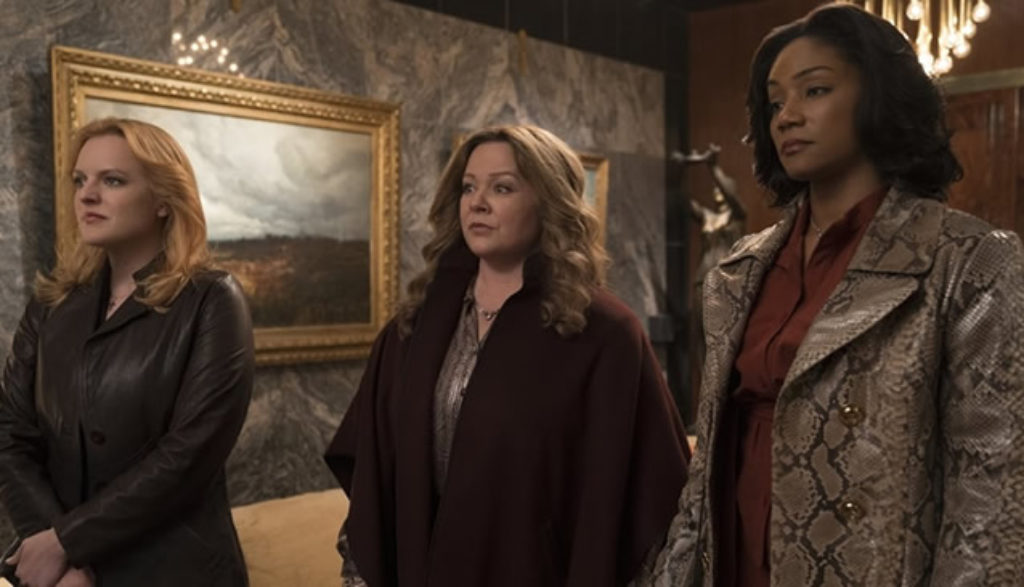
In 1978 New York, the predominantly Irish community of Hell’s Kitchen was no place for a woman. Back then—at least in this crime-saturated corner of it—men took care of the money, the investments and the shady gang deals while their wives stayed at home cooking, raising kids and suffering the occasional beating.
But Kathy, Ruby and Claire were made for more—though to discover it, they first must deal with less.
When their gangster husbands get locked up, they’re left with no resources, no hope and no money. The gang lords are supposed to take care of them, and they do give the women a paltry donation, but unfortunately a few bucks won’t cover rent and food—and these women are not about to beg.
So Kathy, Ruby and Claire decide to take matters into their own hands by taking over their husbands’ questionable business. Slowly but surely, they take over Hell’s Kitchen, one protection payment at a time. But their new path will require bloodshed and the upheaval of everything they’ve ever known.
Although Kathy, Ruby and Claire eventually become criminals, they begin their journey out of necessity and a desire to provide for themselves and their families.
It’s clear Kathy is a loving wife and mother. Unlike Ruby and Claire, Kathy loves her husband but, as we later learn, she’ll always put the safety of her children before anything, or anyone, else. Kathy’s father and mother are loving parents and grandparents who want the best for their daughter and grandchildren.
Ruby is, underneath her tough exterior, a woman who wrestles to balance compassion and her need for self-preservation. Claire, for her part, becomes a woman able to stick up for herself and put an end to years of abuse. Claire’s lover, Gabriel, protects and truly loves Claire.
The movie also doles up messages about women having the ability and talent to pursue their dreams, even though their dreams lead them down dark paths.
We see three funerals, one outside (presided over by a priest) and the other two inside Catholic churches. In each ceremony, people pray (including The Lord’s Prayer) and cross themselves. A mother prays with her two children at dinner. Men and women wear cross necklaces. A statue of Mary sits in a church.
Claire, although still married to her abusive husband, kisses and has sex with another man who becomes her lover. The two have sex (we see their bare shoulders, along with a few movements, and hear sounds). Claire and her lover talk about making a baby. Claire is nearly raped by an evil mob lord (he pushes her forward and attempts to lift her dress but is shot before anything else happens).
Similarly, Ruby kisses and has sex with another man while she’s married (we don’t see them having sex, but it is implied). Ruby and her mother-in-law have a crude conversation about Ruby’s husband and his infidelity.
A few men and women make crude comments about oral sex, ejaculation, strip clubs and bare breasts. An elderly woman makes a crass joke about Joseph “knocking Mary up.” Signs for a porn shop flash in the background in one scene.
Women wear cleavage-baring tops and one shirt briefly reveals a woman’s stomach. Claire and Ruby wear silky nightgowns to bed. Ruby hides cash in her bra. Women are often cat-called on the street.
Man alive, this flick is violent.
When Kathy, Ruby and Claire are left without their husbands, they begin to take matters of provision and protection into their own hands. At first, they begin by taking over their protection racket by hiring a group of men to do their killing for them. But as time goes on, they become more comfortable taking on the messy job themselves—and getting rid of the bodies when necessary. Men are shot in the head at point-blank range as blood splatters in all directions; others are kicked, hit, stabbed and left for dead. One man and his lover lie in bed, dead, after being shot (blood covers their bodies and the walls). A woman is shot in the neck and blood pours from her fatal wound. An elderly woman is pushed down the stairs and falls to her death.
Claire, with the help of her lover, Gabriel, learns how to dismember dead bodies and puncture them so they sink to the bottom of the river. (Gabriel actually teaches all three women, but Claire is the only one who can stomach the process and actually enjoys it.) Gabriel describes, in great detail, how to cut a body apart. We hear bones cracking and flesh being cut open. In one scene, a man’s dead body lies in a bathtub, covered in blood, as Claire asks if she can mutilate and dismember what’s left.
Claire is abused by her husband and, as she mentions, has suffered physical and emotional abuse for 10 years. At the beginning of the movie, she places ice against a large facial bruise. When her husband sees her nursing her wound, he yells at her and knocks the ice from her hands. Later, her husband punches her repetitively in the stomach and we learn that this is how she miscarried years prior. But her husband isn’t the only one who hurts her. Claire is a target for abuse early on. She’s knocked out by a homeless man and, as mentioned, nearly raped by a violent, powerful crime lord.
A group of three men rob a convenience store, hit an elderly man in the head with a gun and, when confronted by FBI agents, they kick and punch them. Ruby’s mother tells her that she beat her as a child to remove her gentle nature, like “beating out the devil.” Men and women plot murders and utter death threats.
God’s name is misused five times, occasionally paired with “d–n,” and Jesus’ name is abused three times. The f-word is used nearly 70 times, the s-word is uttered more than 20 times and the c-word twice. Other profanities include “h—,” “b–ch,” “screw,” “d–k” and “a–.”
A group of women are referred to as “t–ts” and “whores.”
Men and women consume wine and beer and take shots of hard liquor. Men smoke cigarettes. A homeless man is asked to leave a church when they find out “he’s high.” A mom tells her adult daughter that her elementary teacher died of an overdose with a “needle sticking out of his arm.” A group of men deny that they are “drug pushers.”
There’s a strong feminist message here that devalues the role and necessity of men in the world and denigrates the beauty of marriage.
Ruby has learned from a young age that being black does not work in her favor, as men and women alike make racially degrading comments and belittle her. Her own Irish mother-in-law makes it clear that she hates her and her skin color. In fact, racism of all sorts seeps through; the Irish hate the Italians, the Jews despise the Irish, and so on. The Irish as referred to as “dogs.”
Throughout the entire film, women are degraded. Their own husbands, along with most men, ignore their value and talents. Corruption, lies and betrayal run rampant.
Two women steal from a diamond shop. Women and men are blackmailed. Corrupt cops allow evil to happen when they’re paid off. We hear a man urinate. Husbands willingly betray their wives and vice versa.
Based on a DC comic of the same name, The Kitchen centers on the violent world of the 1970’s when gangs and mafias (according to the comic) ruled the streets.
It’s a shocking film, in more ways than one. I found it interesting to see Melissa McCarthy and Tiffany Haddish in such serious roles. To their credit, they were funny and played their parts well. Of course, Elisabeth Moss did too, but she’s accustomed to playing serious, slightly demented roles.
However, other than a few positive messages, this film is content heavy to its core. Violence is brutal and pervasive, sexual content is laced throughout and racism and discrimination play big roles. This isn’t a movie made for dinnertime conversation, and it certainly would do well to stay out of your kitchen.

Kristin Smith joined the Plugged In team in 2017. Formerly a Spanish and English teacher, Kristin loves reading literature and eating authentic Mexican tacos. She and her husband, Eddy, love raising their children Judah and Selah. Kristin also has a deep affection for coffee, music, her dog (Cali) and cat (Aslan).